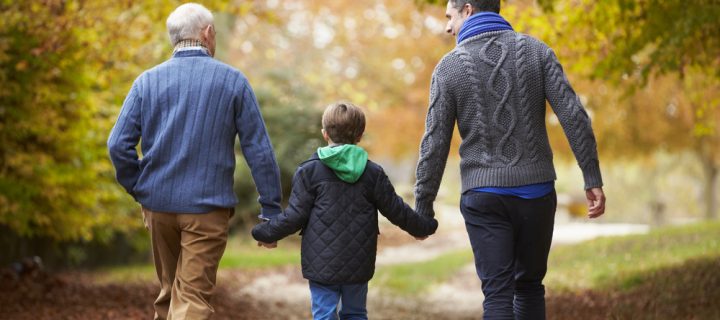Resource sharing has led to indirect reproduction, something that sets humans apart.
Grandparents are great for extra cookies, walks in the park, and emergency babysitting on weekends. Some scientists are now saying we can also credit them for giving us a longer life. While breakthroughs in medical science have led the way to innovations that have reduced our blood pressure as we age, treated our inability to balance our blood sugar, and kept our heart pumping for years to come, scientists are arguing this isn’t necessarily what has elongated the human lifespan.
Researchers from the University of California-Santa Barbara are arguing that humans live so long because of their elders. Why women, in particular, live many years after their reproductive years have stopped, has been a bit of a mystery.
“From the perspective of natural selection, long post-menopausal life is a puzzle,” said UC Santa Barbara anthropology professor Michael Gurven. “We don’t just gain a few extra years — we have a true post-reproductive life stage,” he pointed out.
For most animals, death comes shortly after they cease to be able to reproduce. Humans and whales are some of the few exceptions to this rule. For example, chimpanzees tend to die off soon after their fertility drops away.
“The potential for long life is part of who we are as humans, an evolved feature of the life course,” Gurven said.
Indirect reproduction
What’s going on in humans is a type of indirect reproduction, researchers are arguing. Resource sharing-being able to pool resources across generations- is what has provided a surplus for groups, and older adults have been a big part of this. With more food around there has been more positive selection for the genes of older adults to survive.
Related: Trying to save money? Avoid coffee before shopping: study
This creates a better chance for them to carry on through the next generation. Scientists say that fitness in later life could actually add up to a few extra children in a social group.
Seniors are also important for things beyond food. They teach and socialize the young, and impart their worldviews and needed lifetime skills to others.
“What this suggests is that human longevity is really a story about cooperation,” Gurven said. “Chimpanzee grandmothers are rarely observed doing anything for their grandkids.”
Important reminders going forward
Gurven points out that society tends to underappreciate older adults and that ageism persists. For example, when COVID-19 hit and seemed to be killing off the elderly more than others, many people weren’t too alarmed. We owe our long lifespan to our elders and should keep this in mind, going forward.
A great portion of the value of our elders is going untapped, Gurven argues.
“It’s time to think seriously about how to reconnect the generations, and harness some of that elder wisdom and expertise,” he said.
Multigenerational households, or homes with three generations or more cohabiting, have quadrupled in the past decade according to statistics. At present, more than 1 in 4 Americans live in a multi generational household. In addition, more than half of all Americans who have children in their home have more than 3 generations under one roof. Rising costs of living and the pandemic have pushed people to cohabit.
So, grab a cookie and a bit of wisdom and thank your seniors. They could be helping your own longevity in ways you might not think about each day but that we all certainly need.
photo credits: Monkey Business Images/Shutterstock.com












